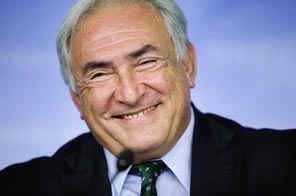Crisis boosts once-hated IMF with new mission
ISTANBUL: The havoc wrought by the economic crisis has given the IMF a new sense of purpose as the world's emergency lender -- and even some of its fiercest critics are starting to mellow.
It is a remarkable turnaround for an institution targeted by anti-globalisation protesters and reviled by millions of people after imposing harsh conditions on its loans during previous crises.
"I think the response has been much more positive in this crisis and it's been very constructive," said Joseph Stiglitz, a Nobel Prize-winning economist well-known for his diatribes against International Monetary Fund lending practices.
Stiglitz spoke on the sidelines of annual meetings of the IMF and World Bank in Turkey's financial capital, Istanbul, where global finance chiefs have hammered out strategies for dealing with the economic crisis.
The IMF has given out tens of billions of dollars in credit to bail out countries affected by the worst global recession since World War II and is giving out zero-interest loans for the world's poorest nations.
Its lending resources were boosted at a summit of the Group of 20 rich and emerging nations earlier this year and it has been tasked by the G20 with monitoring world economic and financial stability to prevent future crises.
"The International Monetary Fund has been one of the few beneficiaries of the global economic crisis," said Barry Eichengreen, economics professor at the University of California, Berkeley.
"Just two years ago, it was being downsized, and serious people were asking whether it should be closed down. Since then, there has been a renewed demand for IMF lending," he said.
Speaking in Istanbul, Cameroonian Finance Minister Lazare Essimi Menye said he believed there had been a "cultural change" at the institution.
South Korean Finance Minister Jeung-Hyun Yoon said IMF lending practices had been overhauled and were now "better-suited to country needs."
But asked about the IMF's ability to tackle the crisis, Ecuadorean Economy Minister Diego Borja told AFP: "You can't block out the sun with a finger."
Critics say the IMF is still imposing strict spending cuts as a condition for its loans in countries that can ill afford them and the Washington-based institution still generates strong animosity in some circles.
Hundreds of anti-IMF protesters clashed with police in the streets of Istanbul on Tuesday and Strauss-Kahn had a show thrown at him by a Turkish journalist during a university lecture ahead of the IMF talks.
In a study published to coincide with the IMF-World Bank meetings, the Centre for Economic and Policy Research (CEPR) in Washington said most current recipients of IMF loans could see their downturns worsen as a result.
"More than a decade after the Asian economic crisis brought world attention to major IMF policy mistakes, the IMF is still making similar mistakes in many countries," Mark Weisbrot, an economist at CEPR, said in a statement.
CEPR said the IMF was promoting spending cuts that could exacerbate the economic downturn in 31 out of the 41 countries with current IMF loan agreements.
IMF spokesman Bill Murray dismissed the report's findings, saying it reached "seriously misleading conclusions" and relied on "faulty analysis."
An even bigger concern among developing countries and anti-poverty campaigners is that the world's poorest nations have little say in decision-making at the IMF even though they are directly affected.
"If the IMF wants to be relevant, effective, credible and legitimate, it has to give countries hardest hit by the financial crisis a say in their own destiny," said Caroline Pearce, from international aid agency Oxfam.
And even some of the fund's most established donors are grumbling.
Germany has complained that expansion of IMF funds by 500 billion dollars (340 billion euros) this year could encourage countries to engage in risky economic policy because they would feel confident of getting a bailout.
Despite the challenges, the mood in IMF corridors is distinctly upbeat.
Speaking to reporters ahead of the Istanbul talks, IMF managing director Dominique Strauss-Kahn said: "This annual meeting may be the starting point for a new IMF.
"And you may say later when you will be talking to your grandchildren that you were in Istanbul at this time."






